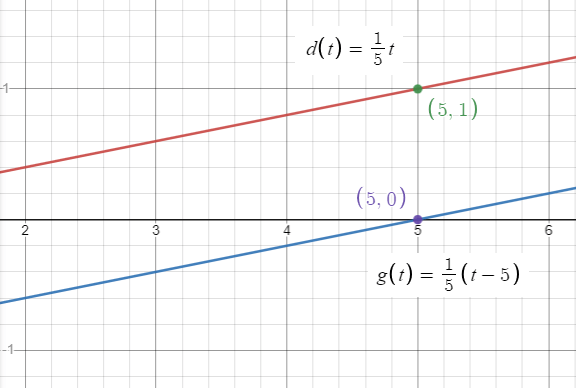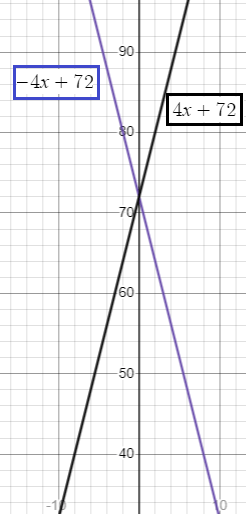COMBINING TRANSFORMATIONS OF FUNCTIONS WORD PROBLEMS
Subscribe to our ▶️ YouTube channel 🔴 for the latest videos, updates, and tips.
Problem 1 :
A cable company charges customers $60 per month for its service, with no installation fee. The cost to a customer is represented by
c(m) = 60m
where m is the number of months of service.
To attract new customers, the cable company reduces the monthly fee to $30 but adds an installation fee of $45. The cost to a new customer is represented by
r(m) = 30m + 45
where m is the number of months of service. Describe the transformations from the graph of c to the graph of r.
Solution :
c(m) = 60m and r(m) = 30m + 45
Thinking about the relationship between 60m and 30m, by dividing 60m by 2 we get 30m.
So, the multiplication factor will be 1/2. Since 1/2 is in between 0 and 1 and it is multiplied by the input, it should be vertical shrink with the factor of 1/2.
After done vertical shrink, there is a translation of 45 units up.
Describing the transformations :
Vertical shrink with the factor of 1/2 and translating the curve up 45 units.
Problem 2 :
The total cost C (in dollars) to cater an event with p people is given by the function
C(p) = 18p + 50
The set-up fee increases by $25. The new total cost T is given by the function
T(p) = C(p) + 25
Describe the transformation from the graph of C to the graph of T.
Solution :
T(p) = C(p) + 25
C(p) = 18p + 50
Applying the value of C(p), we get
Finding the new function :
T(p) = (18p + 50) + 25
= (18p + 50) + 25
T(p) = 18p + 75
Describing the transformations :
C(p) is translating up 25 units vertically.
Problem 3 :
You and a friend start biking from the same location. Your distance d (in miles) after t minutes is given by the function
d(t) = (1/5) t
Your friend starts biking 5 minutes after you. Your friend’s distance f is given by the function
f(t) = d(t − 5)
Describe the transformation from the graph of d to the graph of f
Solution :
Comparing d(t) and d(t - 5), it is clear that we have to move the graph horizontally 5 units to the right.
d(t) = (1/5) t
d(t - 5) = (1/5) (t - 5)
= (t - 5)/5
= (1/5) t - 5/5
= (1/5) t - 1
|
For d(t)
|
For d(t - 5)
|
Coordinates of d(t) :
(5, 1) (10, 2) and (15, 3)
Coordinates of d(t - 5) :
(5, 0) (10, 1) and (15, 2)
For every 5 minutes, your friend will be 1 mile away from you.

Problem 4 :
The function
t(x) = −4x + 72
represents the temperature from 5 P.M. to 11 P.M., where x is the number of hours after 5 P.M. The function
d(x) = 4x + 72
represents the temperature from 10 A.M. to 4 P.M., where x is the number of hours after 10 A.M. Describe the transformation from the graph of t to the graph of d.
Solution :
t(x) = −4x + 72 and d(x) = 4x + 72
In the function f(x), applying x as -x
t(-x) = -4(-x) + 72
t(-x) = 4x + 72
d(x) is reflection of the graph of t(x) with respect to y-axis.

Problem 5 :
A school sells T-shirts to promote school spirit. The school’s profit is given by the function
P(x) = 8x − 150
where x is the number of T-shirts sold. During the play-offs, the school increases the price of the T-shirts. The school’s profit during the play-offs is given by the function
Q(x) = 16x − 200
where x is the number of T-shirts sold. Describe the transformations from the graph of P to the graph of Q
Solution :
P(x) = 8x − 150 and Q(x) = 16x − 200
2 P(x) - 50 = 2(8x) - 150 - 50
Vertical stretch with the factor of 2 and translation vertically 50 units.
Problem 6 :
The graph of
f(x) = x + 5
is a vertical translation 5 units up of the graph of f(x) = x.
How can you obtain the graph of
f(x) = x + 5
from the graph of f(x) = x using a horizontal translation?
Solution :
f(x) = x - (-5)
Horizontal translation of 5 units left.
Problem 7 :
When is the graph of y = f(x) + w the same as the graph of y = f(x + w) for linear functions? Explain your reasoning.
Solution :
y = f(x) + w
y = f(x + w)
The above two functions will not have same graph.
In the function y = f(x) + w, w is the number of units of vertical translation. If w is positive, we have to move up. If w is negative, we have to move down.
Here y = f(x + w), w have to understand it as f(x - (-w))
Here -w tells us, we have to move the graph horizontally w units left.
Subscribe to our ▶️ YouTube channel 🔴 for the latest videos, updates, and tips.
Recent Articles
-
Finding Range of Values Inequality Problems
May 21, 24 08:51 PM
Finding Range of Values Inequality Problems -
Solving Two Step Inequality Word Problems
May 21, 24 08:51 AM
Solving Two Step Inequality Word Problems -
Exponential Function Context and Data Modeling
May 20, 24 10:45 PM
Exponential Function Context and Data Modeling